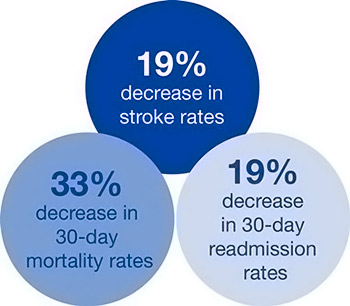
Wesley Warren, Music Director at St. Barnabas Church for the past 29 years, is back playing the organ after suffering a TIA in the spring.
On one of the first hot days of 2016, after painting his front step, Wesley Warren started to feel lightheaded. And then his left arm went completely numb.
“I know the symptoms, but the last thing you want to think about is a stroke, even if it was the first thing that popped into my mind,” said Warren, the 60-year-old Music Director at St. Barnabas Church, who has also played for the National Arts Centre Orchestra.
After Warren regained control of his arm, he decided to continue with his plan to attend his exercise class at the YMCA. He began driving but eventually pulled his car over. After finally contacting his wife – he didn’t want to create a fuss by calling 911 – she picked him up and took him to the Emergency Department at the Civic Campus of The Ottawa Hospital.
“By the time she arrived my speech had really slowed, there was quite a delay and that’s when I knew something was seriously wrong,” he said.
A lot has changed since the Ontario Stroke Strategy began 10 years ago to improve care for patients with transient ischemic attacks (TIAs) and strokes in the Champlain LHIN. Before, referrals from the Emergency Department, family doctors and specialists were all triaged separately, which led to gaps in access to care. But now, there’s a standardized referral process for all new consult requests to the Stroke Prevention Clinic (SPC), resulting in significant improvements for patients.
Since 2004-2005, there has been a 19-percent decrease in stroke rates, a 33-percent decrease in 30-day mortality rates and a 19-percent decrease in 30-day readmission rates.
In the Emergency Department, Warren was triaged and assessed right away. A preliminary work-up was completed, with referral to The Ottawa Hospital’s SPC. He was diagnosed with a TIA, all in about five hours.
The SPC uses an outpatient model with a nurse-led triage process. As well, there are designated diagnostic imaging time slots, so high-risk stroke patients, such as Warren, can be seen quickly by a dedicated stroke-prevention team.
“We also empowered nurses to triage patients twice: once when they’re first referred and then after their testing is completed so that no one falls through the cracks,” said Sophia Gocan, Nurse Specialist for the SPC. “These patients can be seen by any of our neurologists in clinic even if they have not followed them before.”
Warren is now back to playing the organ, but is on blood thinners and followed by the SPC. His TIA was deemed minor, but that didn’t stop his wife – a former nurse – from having a few things to say about not calling 911.
“She scolded me thoroughly,” he said.


Support patient care and research at
The Ottawa Hospital


 To reset, hold the Ctrl key, then press 0.
To reset, hold the Ctrl key, then press 0.